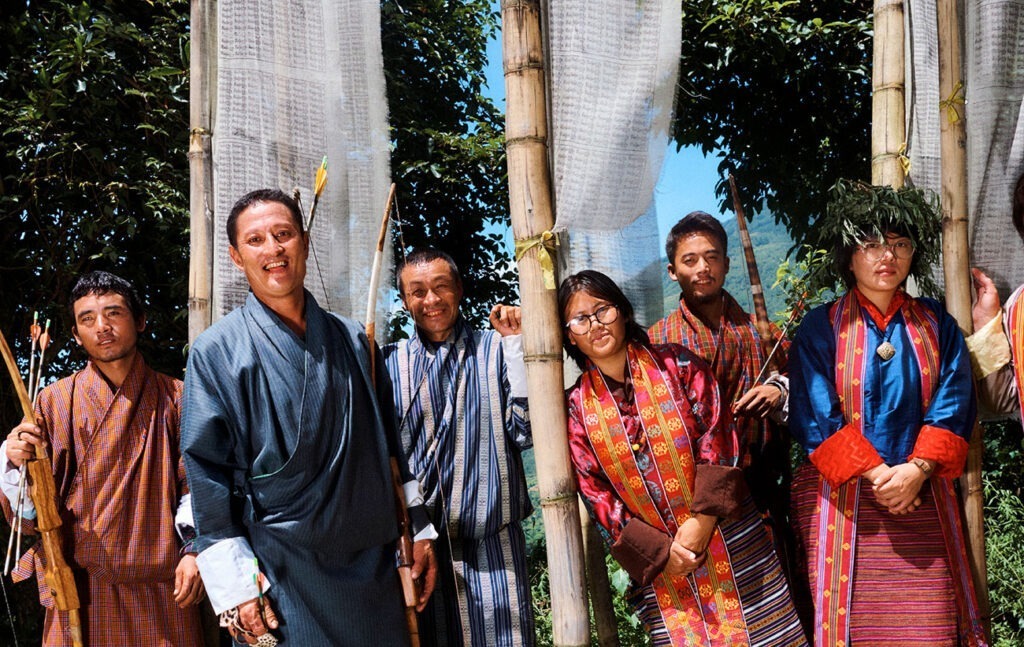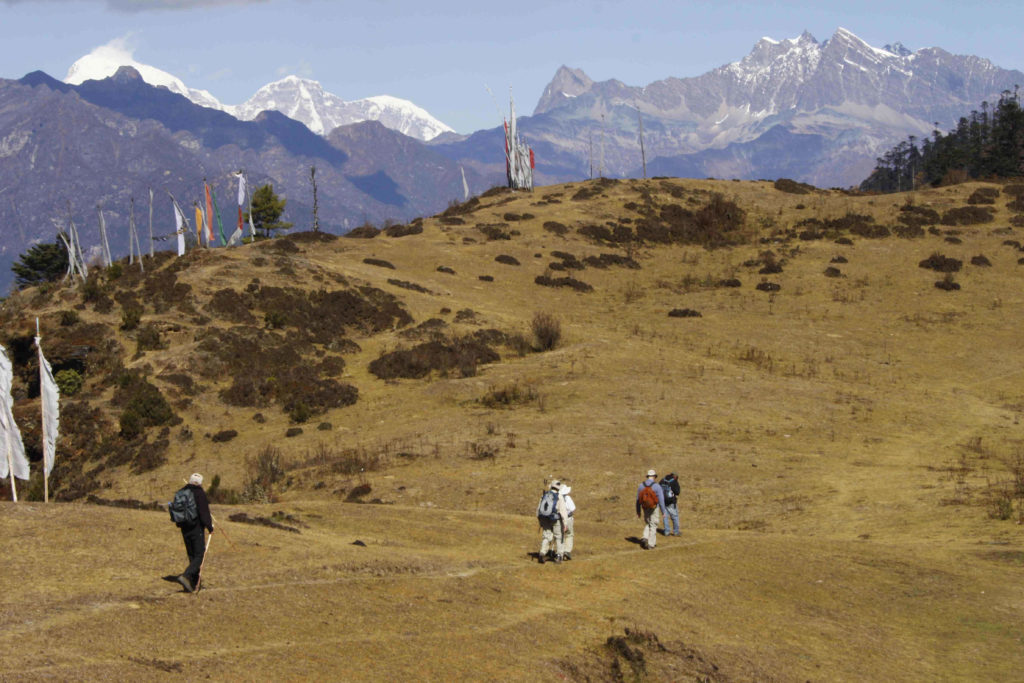Must-Know Bhutanese Travel Phrases

Table of Contents
Bhutan and its Unique Language
Nestled in the majestic Himalayas, Bhutan is a captivating country known for its breathtaking landscapes, rich cultural heritage, and warm hospitality. As a traveler, immersing yourself in the local culture is an essential part of any journey. And what better way to connect with the people of Bhutan than by learning their language?
The Bhutanese language, known as Dzongkha, is the official language of Bhutan. While English is widely spoken in urban areas, mastering a few basic Bhutanese travel phrases will not only enrich your experience but also help you navigate through the country with ease.
Importance of Learning Basic Bhutanese Travel Phrases
As a traveler in Bhutan, learning basic Bhutanese travel phrases is crucial for several reasons. Firstly, it shows respect for the local culture and demonstrates your genuine interest in connecting with the people. Secondly, it allows you to interact more effectively with locals, which can enhance your overall experience and open doors to authentic experiences. Lastly, knowing the language can be immensely helpful in practical situations, such as asking for directions, ordering food, or negotiating prices while shopping.
Essential Words and Phrases for Tourists in Bhutan
To make the most of your journey in Bhutan, it’s essential to familiarize yourself with some key Bhutanese travel phrases. Here are a few words and expressions that will prove invaluable during your time in the Land of the Thunder Dragon:
Kuzuzangpo – This is the traditional Bhutanese greeting, meaning “hello” or “welcome.” It’s a warm way to initiate conversations with locals and make a positive impression.
Nga – This word means “I” and is useful for introducing yourself. You can follow it with your name to say “I am [your name].”
Kadrinchey – When you want to say “thank you,” use this word. Expressing gratitude is an important aspect of Bhutanese culture, so ensure you use it frequently.
Ga Tey – When you’re asking for directions, use this word, which means “where.” You can follow it with the name of the place you’re looking for to ask, Where is [place name] Ga Tey en na La “Where is [place name]?”
Remember, practicing these basic phrases will not only help you communicate effectively but also leave a positive impression on the locals you encounter.
Practical Phrases for Navigating Bhutan’s Transportation System
Getting around in Bhutan is an adventure in itself, with winding mountain roads and awe-inspiring vistas at every turn. To navigate the country’s transportation system smoothly, here are some practical phrases to keep in mind:
Lam – This word means “road” and is useful when asking for directions or inquiring about the condition of a particular road.
Chhu – water.
Tshongkhang – Shop
By familiarizing yourself with these practical phrases, you’ll be able to navigate Bhutan’s transportation system with confidence and ease.
Useful Expressions for Dining Out in Bhutan
One of the highlights of any trip to Bhutan is indulging in the country’s delicious cuisine. From spicy curries to savory dumplings, Bhutanese food is a delight for the senses. To enhance your dining experience, here are some useful expressions to remember:
Ema datshi atsi Zu Gae La – This phrase is a must-know for any food lover in Bhutan. It means “May I have some ema datshi, please?” Ema datshi is a popular Bhutanese dish made with cheese and chili peppers.
Ara, – Ara is a traditional Bhutanese alcoholic beverage, similar to whiskey.
Mastering these expressions will not only help you order your favorite Bhutanese dishes but also impress the locals with your appreciation for their culinary heritage.
Common Sayings and Greetings for Interacting with Locals
Interacting with locals is an excellent way to learn about the culture and traditions of Bhutan. Here are some common sayings and greetings that will help you connect with the people:
Tashi delek – meaning “blessings and good luck.” alternate also used as “congratulation”
Kadinchey – When you want to say “thank you” in a more formal or respectful manner, use this phrase. It’s a polite way to express gratitude.
Losar tashi delek – Losar is the Bhutanese New Year, and this phrase means “Happy New Year.” Use it during the festive season to wish locals a joyful celebration.
Nga gi charo – This phrase means “my friend” and can be used to address someone in a friendly manner. It’s a great way to break the ice and establish a connection.
Charo= friend
Kuzu zangpo la – This is a formal way to greet someone, meaning “good morning” or “good day.” It’s a respectful way to initiate conversations with elders or people in positions of authority.
By incorporating these sayings and greetings into your interactions, you’ll be able to forge meaningful connections with the friendly people of Bhutan.
Handy Phrases for Shopping and Bargaining in Bhutan
Exploring the local markets and handicraft shops is a must-do when visiting Bhutan. To make your shopping experience more enjoyable, here are some handy phrases for bargaining and making purchases:
A ni gi then lu teru(money) gam chi mo? – When you want to ask for the price of an item, use this phrase. It means “What is the cost for this?”
nga chue ta wa chin khae me ya?- If you’re interested in trying on clothes or shoes, use this phrase to ask, “Is itfine if I try this on?”
Gho is the male traditional Bhutanese dress and kira is the female dress.
Communication Tips for Emergencies and Seeking Help
While Bhutan is generally a safe country for travelers, it’s always wise to be prepared for unforeseen situations. Here are some basic communication tips that can help you during emergencies or when seeking help:
If you need to call the police, call 113
In case of a medical emergency, call 112
Elderly Care/Medicaton Refill – call 6060.
Disaster Communication Helpline – 999.
Fire Station – call 110
Cultural Etiquette and How Learning the Language Enhances Your Experience
Learning the Bhutanese language not only allows you to communicate effectively but also enhances your understanding of the local culture and traditions. Here are some cultural etiquette tips that can further enrich your experience:
Dress modestly – Bhutan is a conservative country, and it’s important to dress modestly, especially when visiting religious sites or attending cultural events.
Remove your shoes – When entering temples, monasteries, or homes, it’s customary to remove your shoes as a sign of respect.
Respect religious customs – Bhutan is a deeply spiritual country, and it’s essential to respect the customs and traditions associated with Buddhism.
Ask for permission before taking photos – While Bhutan offers countless photo opportunities, it’s polite to ask for permission before taking pictures of people or religious artifacts.
Engage in cultural activities – Participate in local festivals, try traditional Bhutanese cuisine, and engage in cultural activities to fully immerse yourself in the vibrant Bhutanese culture.
By learning the language and respecting the local customs, you’ll be able to connect with the people of Bhutan on a deeper level and create lifelong memories.
Learning basic Bhutanese travel phrases is a gateway to unlocking the charm and beauty of this enchanting country. By mastering essential words and expressions, you’ll be able to navigate Bhutan with ease, connect with the locals, and create lasting memories.
If you’re eager to dive deeper into the Bhutanese language, there are several resources available. Online language courses, phrasebooks, and language exchange programs can further enhance your language skills and cultural understanding.
So, pack your bags, immerse yourself in the local culture, and embark on a journey to discover the hidden treasures of Bhutan.

